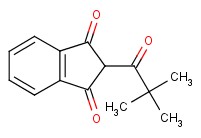-
Name
PINDONE
-
EINECS
201-462-8
Annex I Index No:606-016-00-X
Stability
- Stable. Incompatible with strong oxidizing agents.
Toxicology
- Toxic if swallowed. May be harmful if inhaled or in contact with the skin.
Toxicity data
PINDONE Chemical Properties
The Molecular formula of PINDONE(83-26-1): C14H14O3
The Molar mass of PINDONE(83-26-1): 230.26 g/mol
IUPAC Name: 2-(2,2-dimethylpropanoyl)indene-1,3-dione
EINECS: 201-462-8
storage temp.: APPROX 20 °C
Other names: 2-Pivaloyl-1,3-indandione
The Structure of PINDONE(83-26-1):

The Molar mass of PINDONE(83-26-1): 230.26 g/mol
IUPAC Name: 2-(2,2-dimethylpropanoyl)indene-1,3-dione
EINECS: 201-462-8
storage temp.: APPROX 20 °C
Other names: 2-Pivaloyl-1,3-indandione
The Structure of PINDONE(83-26-1):

PINDONE Uses
Pindone(83-26-1) is an anticoagulant drug for agricultural use. It is commonly used as a rodenticide in the management of rat and rabbit populations.
PINDONE Toxicity Data With Reference
| 1. | orl-rat LD50:280 mg/kg | TXAPA9 Toxicology and Applied Pharmacology. 2 (1960),88. | ||
| 2. | ivn-rat LD50:50 mg/kg | YKYUA6 Yakkyoku. Pharmacy. 31 (1980),1385. | ||
| 3. | par-rat LD50:50 mg/kg | GUCHAZ Guide to the Chemicals Used in Crop Protection 6 (1973),415. | ||
| 4. | orl-dog LD50:75 mg/kg | 85GYAZ Pflanzenschutz-und Schaedlingsbekaempfungsmittel: Abriss einer Toxikologie und Therapie von Vergiftungen 2nd ed.,Klimmer, O.R.,Hattingen, Germany.: Hundt-Verlag,1971,118. | ||
| 5. | orl-rbt LD50:150 mg/kg | 85DPAN Wirksubstanzen der Pflanzenschutz und Schadlingsbekampfungsmittel Werner Perkow,Berlin, Germany.: Verlag Paul Parey,1971/76. | ||
| 6. | orl-dom LDLo:75 mg/kg | AWLRAO Australian Wildlife Research. 5 (1978),135. |
PINDONE Consensus Reports
Reported in EPA TSCA Inventory.
PINDONE Safety Profile
Poison by ingestion, intravenous, and parenteral routes. Causes reduced blood clotting, which leads to hemorrhaging. Used as an anticoagulant and rodenticide. When heated to decomposition it emits acrid smoke and irritating fumes. See also WARFARIN.
Hazard Codes: T,
T, N
N
Risk Statements: 25-48/25-50/53
25: Toxic if swallowed
48/25: Toxic: danger of serious damage to health by prolonged exposure if swallowed 50/53: Very Toxic to aquatic organisms, may cause long-term adverse effects in the aquatic environment
Safety Statements: 37-45-60-61
37: Wear suitable gloves
45: In case of accident or if you feel unwell, seek medical advice immediately (show label where possible)
60: This material and/or its container must be disposed of as hazardous waste
61: Avoid release to the environment. Refer to special instructions safety data sheet
RTECS: NK6300000
HazardClass: 6.1(b)
PackingGroup: III
Hazard Codes:
 T,
T, N
N Risk Statements: 25-48/25-50/53
25: Toxic if swallowed
48/25: Toxic: danger of serious damage to health by prolonged exposure if swallowed 50/53: Very Toxic to aquatic organisms, may cause long-term adverse effects in the aquatic environment
Safety Statements: 37-45-60-61
37: Wear suitable gloves
45: In case of accident or if you feel unwell, seek medical advice immediately (show label where possible)
60: This material and/or its container must be disposed of as hazardous waste
61: Avoid release to the environment. Refer to special instructions safety data sheet
RTECS: NK6300000
HazardClass: 6.1(b)
PackingGroup: III
PINDONE Standards and Recommendations
OSHA PEL: TWA 0.1 mg/m3
ACGIH TLV: TWA 0.1 mg/m3
NIOSH REL: (Pindone) TWA 0.1 mg/m3
ACGIH TLV: TWA 0.1 mg/m3
NIOSH REL: (Pindone) TWA 0.1 mg/m3
About|Contact|Cas|Product Name|Molecular|Country|Encyclopedia
Message|New Cas|MSDS|Service|Advertisement|CAS DataBase|Article Data|Manufacturers | Chemical Catalog
©2008 LookChem.com,License: ICP
NO.:Zhejiang16009103
complaints:service@lookchem.com Desktop View